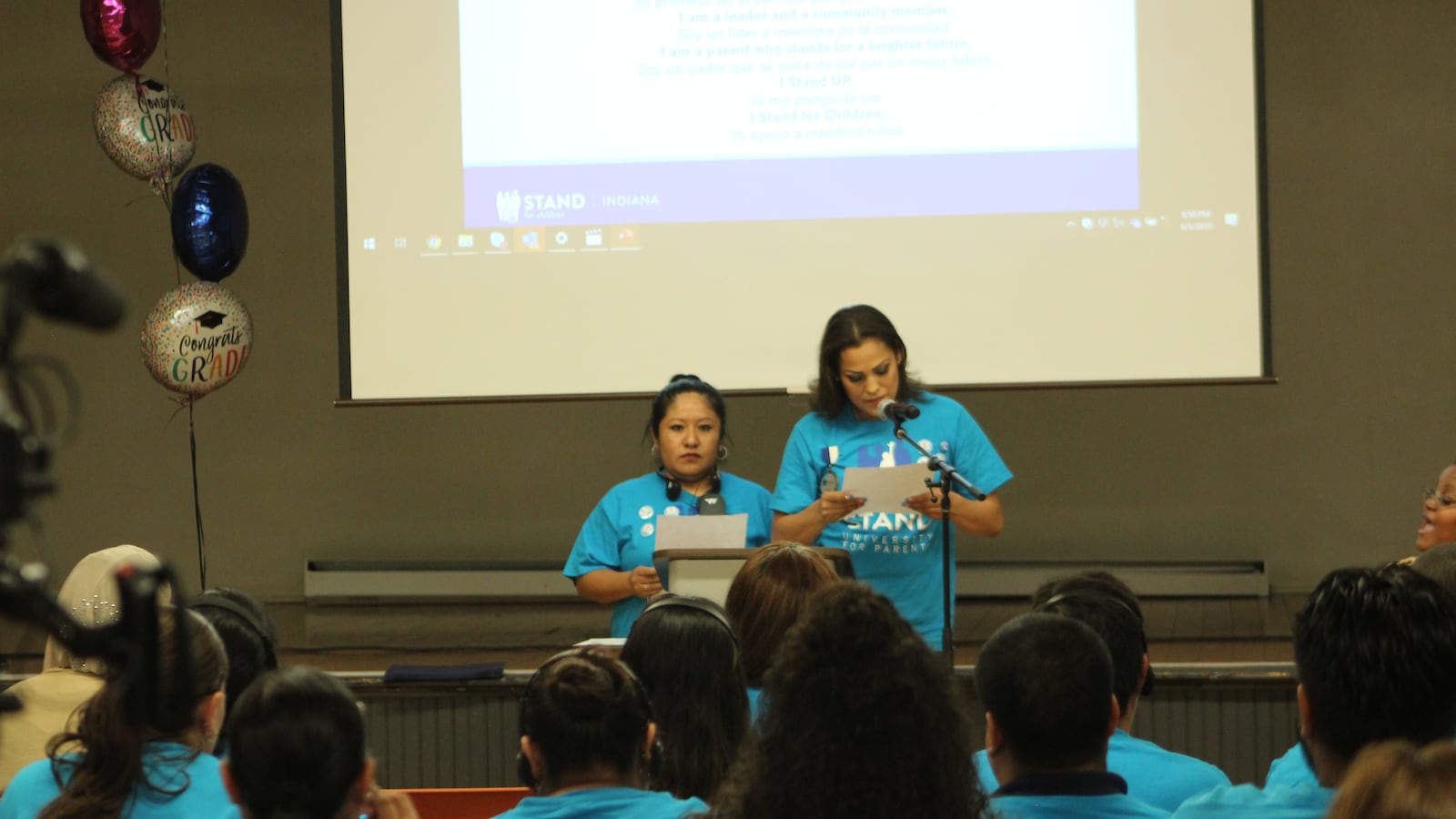Standing at a podium in a crowded school gymnasium Wednesday night, 30-year-old Bibiano Cuautle recounted a time when he couldn’t see the benefit of a formal education.
“I felt like the school wasn’t taking care of me,” Cuautle said. “They were just like, if you’re there, you’re there. And if you’re not, they just keep going without you.”
An immigrant from Mexico, Cuautle dropped out of school in ninth grade and moved to Indianapolis, where he would meet his wife and start work at a restaurant. But when he became a father, Cuautle realized he had to reconcile his past lapse in education.
That’s why he joined Stand University for Parents, or Stand UP, a parent outreach program designed to help people like Cuautle stay involved in their children’s learning. And Wednesday night, he told his story to a mix of parents, relatives, and children assembled to celebrate the program’s fifth graduating class.
In order to graduate, Stand UP participants like Cuautle must complete between three and five weeks of classes, touching on everything from college readiness to reading at home. Through the experience, parents are expected to walk away with six strategies for engaging with their children, such as serving as their “first and most important teacher.”
And as a Hispanic man, Cuautle said he also had to learn to subvert his culture’s expectation that he work long hours — it’s not uncommon, Cuautle said, for him and others in his community to work 12-hour days or hold multiple jobs — to fulfill his obligations as a father.
His work schedule doesn’t leave much time for him to act as a parent advocate to ensure his children succeed in school, but this year, he’s made it a priority by participating in Stand UP.
“We need to pay attention to our kids,” Cuautle said.
Stand University for Parents, made available through a partnership between Indianapolis Public Schools and a state offshoot of the national education nonprofit Stand for Children, helped him achieve that balance.
Created to help families keep their children engaged outside of school and hold school officials accountable, Stand UP has helped 550 parents and relatives like Cuautle cultivate a community, according to program officials.
Parents at four IPS schools were honored at the Stand UP graduation ceremony Wednesday — School 94, Global Prep Academy at School 44, and the Phalen Leadership Academies at School 93 and School 103. It’s notable that all but one — School 94 — have used the controversial innovation model to turn around their once-failing institutions. And in 2018, School 94 submitted a letter of interest to explore an innovation restart.
Stand for Children has been criticized for its endorsement of IPS’ innovation school model when it began in 2015 and for its backing of candidates who support expanding Indianapolis’ innovation network.
But Justin Ohlemiller, executive director of Stand for Children Indiana, brushed aside concerns that the group has a pro-charter agenda. He said the people who benefit from Stand UP aren’t concerned with the debate around school choice and innovation network schools, and his organization doesn’t limit support to one type of program.
“Overwhelmingly, the parents we work with don’t care about what kind of school it is. They just want a quality school for their kids,” Ohlemiller said. “The program is really about serving IPS parents regardless of what type of school they’re in.”
Even still, at the graduation ceremony, Interim IPS Superintendent Aleesia Johnson delivered an anecdote about how different school models benefited her family, and how her parents’ ability to choose was a form of advocacy to emulate.
While growing up in Evansville, Indiana, Johnson said her mother, then a middle school educator, made the decision to place Johnson in a local private school while keeping her younger brother in the public school system, where he was excelling in athletics.
“Both of our paths got us to the same goal our parents wanted us to be at, but they made a choice that was going to be the right choice for their child,” Johnson said.
During her speech, Johnson acknowledged that families might have a difficult time agreeing on how districts should arrange their schools. But groups like Stand UP, she said, are a way to unite parents across differences — including where they diverge on critical arguments around school type.
“The reality is we may not always be on the same page about what’s the best way to set them up for success, and that’s okay,” Johnson said.
While Stand UP is branded as a way to instill confidence in parents, the group also tackles other hot-button education issues — including crash courses on school-to-prison pipelines, assessing school performance data, and communicating with district officials — in individual classes.
Shawanda Tyson, 36, a 2015 graduate of Stand UP who is now a paid volunteer manager, said she knows from personal experience the dangers of an uninformed school community. In 2017, her neighborhood school, School 42, was restarted as an innovation school after it received failing performance grades from the state for several years, and Tyson saw other parents struggle to understand or respond to the dramatic changes.
Tyson, who credits her time in Stand UP with supporting her through her school’s transition, said Stand for Children pushes against uncertainty and unifies communities in dire times.
She’s also witnessed the ire that’s followed Stand for Children’s presence, and said claims that parents aren’t the driving force behind the organization are largely uninformed.
“That’s not true, because I’m the living truth,” Tyson said.
Correction: This article was updated to reflect the correct number of weeks parents had to attend classes.

